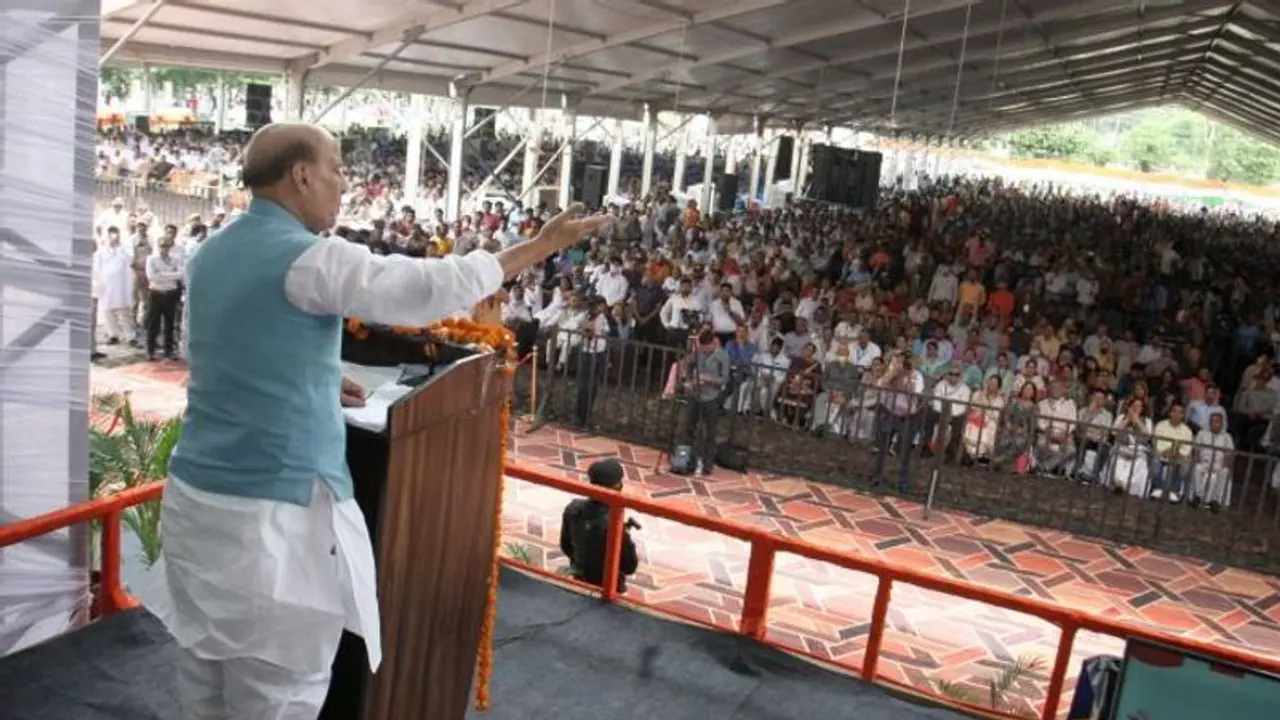"I come from a particular political party (BJP), and I do not want to criticise him. I also do not raise questions about any prime minister's intentions. Because I know that the intentions of any prime minister could not be wrong. There can be issues with their policies," Defence Minister Rajnath Singh said.
While remembering the soldiers who laid down their lives to protect India's sovereignty and integrity, including in the 1962 war with China, Defence Minister Rajnath Singh on Sunday said that despite being coming from the BJP, he cannot criticise former Prime Minister Pandit Jawaharlal Nehru for his intentions.

Also Read: New Chinese provocation! Strategic 'G695' highway through Aksai Chin
Speaking at an event commemorating 23 years of 'Kargil Vijay Diwas' in Jammu, Rajnath Singh said: "I would like to remind you of the incidents of 1962. It was clear that the intention of China was not in the right spirit. Pandit Jawaharlal Nehru was our prime minister. Many people criticise him. I come from a particular political party (BJP), and I do not want to criticise him. I also do not raise questions about any prime minister's intentions. Because I know that the intentions of any prime minister could not be wrong. There can be issues with their policies.... But you all are well aware of what we had faced in 1962."
He further said, "Today, India is growing very fast and being the defence minister of this country, I can say our India is not a weak country; it is becoming one of the strongest countries in the world."
Talking about Jammu & Kashmir and Ladakh, the minister said that India waged five wars with China and Pakistan, including a limited war with Pakistan in Kargil in 1999, and these two areas had been the 'main theatre war' in all these wars.
While stating that New Delhi wanted cordial ties with its neighbours, Pakistan thought otherwise and ultimately had to pay the price for eyeing Indian territory.
"The last war between India and Pakistan was the 1999 Kargil War. I believe this war was not a full-scale war but a limited one. But in every war, our Indian jawans have made supreme sacrifices. The entire area of Jammu & Kashmir and Ladakh was a 'main war theatre'. After Independence, the enemies had their eye on this region, but with their bravery and courage, Indian soldiers were able to foil these plans," Singh said.
Recalling former prime minister Atal Behari Vajpayee, Rajanath Singh said: "Many operations have happened, are happening and will happen in the future, if needed. Pakistan is our neighbour. Vajpayee said we could not change our neighbour. We want good relations with our neighbours. I don't know what happened to our neighbour. They have now entered into a proxy war. They want to bleed India with a thousand cuts."
As for Pakistan-occupied Kashmir, the defence minister reiterated that Parliament had passed a resolution that the area is an integral part of India and will remain so.
Pokhran Nuclear Exploration 1998
"During the nuclear test, we did not get international support, but Vajpayee stood behind forces. The global community used to threaten India that Pakistan had a nuclear bomb. But Vajpayeeji did not pay any heed to the threat. He also went to Pakistan on a bus and signed a declaration with them, but the country backstabbed India and Kargil happened. In the future, if anyone dares to raise their eyes towards India and war happens, we will win that too," Singh added.
Also Read: Experts warn climate change adding layer of vulnerability to fragile Himalayas
